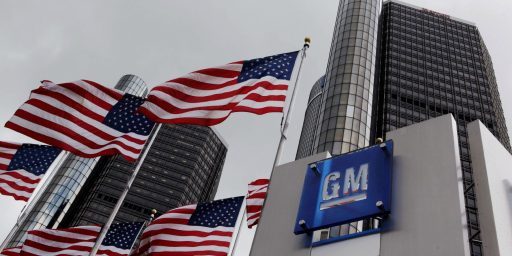New War and the Threat to Globalization
TCS Daily has published my full interview with Brave New War author John Robb as “New War and the Threat to Globalization.”
One excerpt:
Joyner: You say that the Global War on Terror could take down the United States as a Superpower in much the same way that the Soviet Union collapsed in the 1980s, “driven to bankruptcy by a foe it couldn’t compete with economically.” Granting that we’re spending quite literally more money than every other country on the planet combined on defense, we’re still spending a historically low percentage of our GDP. How do we get to the point of bankruptcy?
Robb: The larger context is that the combination of entitlement programs and defense is squeezing out everything else. Eventually even defense will get the squeeze as entitlements and debt run amok with the budget. That isn’t too far out. Further, the global economy we compete in is only going to get more competitive. Additionally, corporations are globalizing (becoming less tied to the US). Ever watch how states compete for a factory? They bleed each other to death with tax giveaways. Our ability to raise taxes only gets more and more difficult over time.
Finally, with systems disruption, it is possible to single out a country or a corporation for punishment. That disruption could drastically harm that country’s ability to compete on a global scale. I don’t think most people realize how quickly a relative decline (either through slower growth or outright contraction) could happen in the current and future economic environments. Things are getting faster, not slower.
See the link for more.






I’m sorry to say but John Robb isn’t the greatest political economist.
I can only use my home state of Wisconsin as an example but the thirst of politicians for more tax money can’t be satiated. Taxes keep going up, rarely down.
Also, while a small state like Estonia might be harmed by an attack on their infrastructure, namely a cyber-attack, the U.S. has more nodes and a larger economic base for better resilience.
Yep, in terms of property taxes and whatnot. But there is a longstanding trend of giving massive tax breaks to corporations to lure them in. Increasingly, taxes are being generated by passing them on to those who don’t have any say-so: Commuter taxes, hotel taxes, and the like that are paid by those who can’t vote in the locality. There’s only so much of that that can happen.
He’s worried that we’ll bankrupt ourselves by continuing to invest more in security the last target set while guerrillas move on to new ones. Given that we’re already going to be spending hundreds of billions on entitlement spending on an aging population, that’s a problem.
This reminds me of Hayek’s Road to Serfdom argument. He argued the West would go down the path of authoritarianism if economic centralization continued. Thankfully that didn’t happen.
In Robb’s case we’ll spend ourselves into a weakened state creating openings for terrorists. While I acknowledge that a nation can’t deficit spend its way to perpetual prosperity or comfort I have confidence that the (mostly) free U.S. economy can grow through much of the impending entitlement troubles. Thomas Barnett’s books have done much to reinforce this belief.
I’ll let you take your pick: naivety or optimism. Then sprinkle on some good, old fashioned hope.
I’ll have to check out the book to dig into this part of his argument.